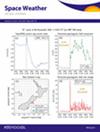Predicting Equatorial Ionospheric Convective Instability Using Machine Learning
IF 3.7
2区 地球科学
引用次数: 0
Abstract
The numerical forecast methods used to predict ionospheric convective plasma instabilities associated with Equatorial Spread-F (ESF) have limited accuracy and are often computationally expensive. We test whether it is possible to bypass first-principle numeric simulations and forecast irregularities using machine learning models. The data are obtained from the incoherent scatter radar at the Jicamarca Radio Observatory located in Lima, Peru. Our models map vertical plasma drifts, time, and solar activity to the occurrence and location of clusters of echoes telltale of ionospheric irregularities. Our results show that these models are capable of identifying the predictive power of the tested inputs, obtaining accuracies around 75%.利用机器学习预测赤道电离层对流不稳定性
用于预测电离层对流等离子体不稳定性与赤道扩散f (ESF)相关的数值预报方法精度有限,而且通常计算成本高。我们测试是否有可能绕过第一性原理数值模拟,并使用机器学习模型预测不规则性。数据来自秘鲁利马Jicamarca射电天文台的非相干散射雷达。我们的模型将垂直等离子体漂移、时间和太阳活动映射到表明电离层不规则的回声簇的发生和位置。我们的结果表明,这些模型能够识别测试输入的预测能力,获得75%左右的准确率。
本文章由计算机程序翻译,如有差异,请以英文原文为准。
求助全文
约1分钟内获得全文
求助全文

 求助内容:
求助内容: 应助结果提醒方式:
应助结果提醒方式:


